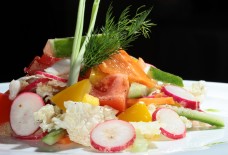America Needs More Restaurants Like Suraya
SOURCE: EATER
BY: BILL ADDISON
The end of 2018 is suddenly a shimmer on the horizon, and to distract myself from obsessing over the Midterm elections I’m turning my thoughts to standout restaurants I’ve visited this year that haven’t yet made it into reviews or columns. Suraya — a Lebanese restaurant in Philadelphia that opened in stages (its bakery and market debuted in November 2017, and it finally began dinner service this past May) — has been top of mind.
That’s partly because of my ongoing wish to see more restaurants serving the varied regional cuisines of the Middle East around the United States, and also because I particularly love the clear, sharp, balanced flavors of Lebanese food. Suraya, named for the grandmother of co-owners/siblings Nathalie Richan and Roland Kassis (who also owns a near-dozen blocks of real estate in the Fishtown neighborhood in which this venture resides), fairly instantly serves some of the country’s finest examples of — and variations on — Lebanon’s trademark dishes.
I’ll start by saying that beyond the core service staff, aspects of hospitality could have used some fine-tuning during my August dinner. A bartender overlooked my colleague for a few minutes too long while she waited to pay for her drink (which couldn’t be transferred to the table). A hostess ignored the request on my reservation for a table near a window (I’m the natural light-craving guy who takes pics at the table, part of my job), at first steering us in that direction and then, without explanation, changing course and insisting I’d be happier in a pitch-dark section of the dining room. Small things, obviously, but they didn’t set the warmest mood for the meal ahead.
Small plates soon began arriving and blotted all that out: labneh (strained yogurt) thickened to the right consistency between mascarpone and fudge; taut makanek (lamb sausages) with clove, cinnamon, and coriander that buzzed in the sinuses; a minty, extra-lemony riff on tabbouleh salad that’s righteously heavy with the parsley (I didn’t detect any cracked bulgur that’s traditionally part of the salad); and sawdat djej, chicken livers varnished with the distinct sour-sweetness of pomegranate molasses. All fantastic.
Entrees include kebabs (beef, lamb, halibut) and a whole dorade that hearkens to a northern Lebanese fish specialty called samke harra that’s slathered in tahini. But it was the two variations on kibbeh that really sold me on Suraya. Kibbeh nayeh, essentially Lebanon’s national dish, would pass muster with my hypercritical Lebanese friends: ground, lightly spiced raw lamb is kneaded with bulgur until the grain is assimilated but the meat is not too compressed; the whole is formed into a circle and dribbled liberally with olive oil. The kitchen here garnishes the plate with mint and raw onions caked with sumac. If you have any affinity for beef tartare, I entreat you to order this masterpiece.
The fried form of kibbeh involves the same two star players — beef and bulgur — but this snack is all about crunch. Cinnamon wafted through Suraya’s version, and pine nuts inside reinforced the crackly exterior.
I was smitten enough to return for lunch, when the menu skews in entirely different, more casual directions. Properly silky hummus can be topped with crisped chickpeas or mushrooms or (a traditional variant and my favorite) shards of roasted lamb. Man’oushe, Lebanon’s ubiquitous thin flatbread, comes covered with za’atar and cheese, or salad, or tomato and kishik (dried yogurt); I loved the warm, crisp-edged man’oushe smeared with labneh and piled with tomatoes, cucumbers, olives, and mint.
Before I left, I stocked up on pastries that I polished off during the train ride back to New York. A kouign amann fragrant with the heady scent of cardamom was greatness. The ma’amoul, a domed cookie filled with dates, made me even happier.
I’m guessing part of Philadelphia’s instant embrace of Suraya can to some measure be credited to the groundwork laid by Zahav, where Michael Solomonov taught the city and, through his booksand a documentary centered on him, also the country about Middle Eastern cooking through an Israeli lens. Suraya stands entirely on its own in its gorgeous space (the tile work in the light-filled front room alone…) and in its exuberant, detailed showcasing of Lebanese foods. Now let’s see more restaurants across our land celebrating the delicious and specific culinary lexicons of Syria, Turkey, Jordan, Yemen, and (beyond the kebabs and yogurt dips of its incredibly diverse repertoire) Iran.
Switching from one arid sweep of the world to another: Might you have any recommendations in Phoenix for me? Beyond the Chris Bianco restaurants?
Your roving critic,
Bill



